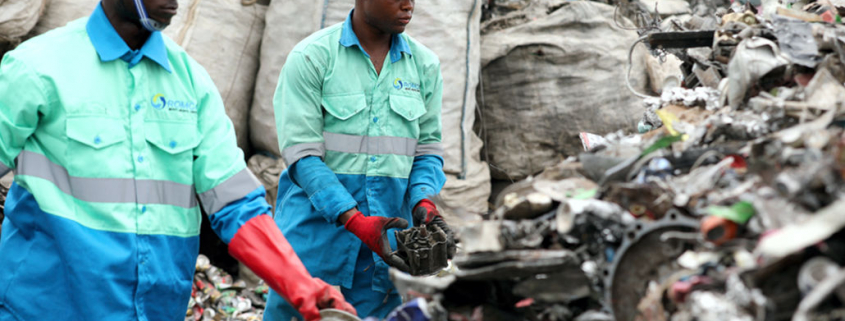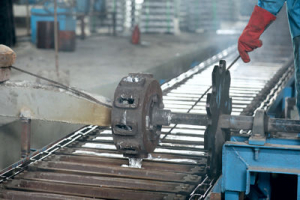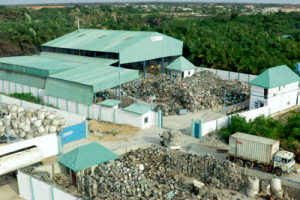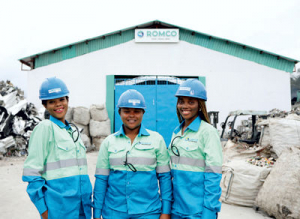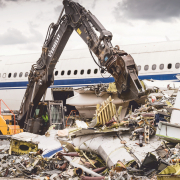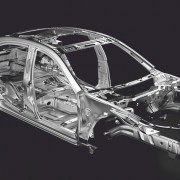Smart Investments Lead to Success
2021 was a strong year for UK-based recycling and trading Romco Group Co Ltd.
In the third quarter alone, the group – consisting of Romco Recycling Company Ltd. in Nigeria, Romco Metals Ltd. in Ghana, and Romco Trading LLC in Dubai – achieved a record-breaking revenue of 9.1 million US-Dollar. Its facilities in Africa recycled 5,257 metric tons non-ferrous metals for the first time, 220 percent more than in the third quarter of 2020.
Since Raymond Onovwigun founded the company in 2015, its revenue has risen consistently. Last year, Romco’s income in the first quarter was 5.8 million US-Dollar and in the second three-month period 7.0 million US-Dollar. The increased income in the third quarter of 2021 underlines that this success did not happen by chance. Over time, Romco expanded from Nigeria to Ghana and recycled more than 22,700 tons of metal, saving carbon emissions. In 2020, the firm started recycling copper, and is now exploring zinc and lead additions to the product line. Today, the group – which employs more than 300 people in the United Kingdom of Great Britain (UK), Nigeria, Ghana, the United Arab Emirates (UAE), and Burkina Faso – is shipping recycled non-ferrous metals to over seventeen countries.
GLOBAL RECYCLING asked Raymond Onovwigun, Chief Executive Officer of Romco Group Co Ltd, how he assesses the African recycling market and the future business opportunities.
Mr. Onovwigun, your company has expanded rapidly. How did you achieve this?
Our company has always been marked by ambitious growth. There is a massive need to increase recycling in the areas we work in. That need is complimented with a growth opportunity, accentuated by limited recycling infrastructure, growing GDP and population, an increasing middle/consumer class, and a growing industrial base throughout the ECOWAS (Economic Community of West African States). We are uniquely positioned to take advantage of these conditions with local knowledge and a model designed to increase recycling capacity where it currently does not exist.
Why did you decide to focus on the African recycling market?
The emerging markets of Africa are where the need and opportunities are and where we know we can make the most initial positive impact. It is estimated that only 13 percent of recyclable goods are diverted from landfills in Nigeria, and that is likely similar throughout the region. When you understand that only one percent of global recycled non-ferrous metals are produced on the continent, with a population of 1.2 billion people and growing, you can see that we are only just scratching the surface with what we can achieve in Africa. But that is not where we limit ourselves. We see Romco as a solution in all emerging markets across the globe, increasing recycling capacity in all places of need.
It seems that the African recycling market holds a wide range of business opportunities. Which areas do you consider to be particularly promising?
Africa has a certain energy to the place. You only know it if you have been there on the ground. There is an appetite for work and progress, an entrepreneurial spirit, if you will, that we have seen in the communities we are immersing ourselves in and building in. There is an infectious hunger and desire to build something truly sustainable and circular. We have seen over 1,000 indirect jobs created beyond our sites, in the communities, because of the external opportunities and building a larger recycling industry. That is the most promising aspect of growing the recycling market. The knock-on effect it has on people, the environment, and the overall wellbeing of everyone we work with.
Romco Metals is mainly involved in the recycling of non-ferrous metals. Are there any plans to expand the recycling activities to other areas? Which would these be?
We are currently focused on the immediate need in front of us. Working on expanding our range of non-ferrous metals and increasing our production efficiency on those lines is our number one priority for now. That said, another need we see in the communities is plastics. That has always been something we have kept an eye on. We know diverting more plastics from landfills and replacing the primary production of plastics with secondary would have a massive positive impact on the ground. It is about doing it right. That takes careful consideration of the model that would work on the ground.
According to Romco’s homepage, “Our investment strategy is best interpreted through our tagline: ‘Invest. Reduce. Grow.‘“ What does that exactly mean?
Invest, Reduce & Grow is what we do. We invest in communities, the environment, and the responsible management of our resources. We reduce carbon emissions, waste, power usage, landfill, and the need to mine virgin resources for the materials we are using. Finally, we are boldly growing recycling capacity worldwide by developing a sustainable business in the renewables sector that is scalable and profitable.
Do external investors also have the possibility to invest in Romco?
Recycling is a very capital-intensive operation. We are always looking for investments, but it must be with the right partners that understand our mission and unique scalable model. So far, we have a strong community of investors that have got us where we are today. The next steps will be even more exciting as we work with a greater investment pool that understands the challenge and rewards of building the recycling sector in emerging markets.
As part of its corporate responsibility, Romco invests in its employees. Which programs are available?
Something unmovable in our ethos is how we treat staff. We provide private healthcare where adequate public healthcare does not exist, pay above-average wages, fully fund technical training to see our employees grow into their full potential, and have an equitable gender agenda. We see this as a cornerstone to how we operate and are constantly looking for ways to improve our employee programs.
Romco intends to expand into new countries, with facilities and operations earmarked for expansion throughout West Africa. Which countries are being considered?
We are looking into East Africa at the moment, opening ourselves up from a port closer to Asia. That would improve the efficiency of our overall operation. We also have long-term designs on South East Asia and South America when the time is right.
To which countries does Romco deliver the secondary metals it produces?
We ship globally, anywhere you can imagine. At the moment, there is a strong demand in China and Japan, so we see quite a bit going to OEM’s there. But we have shipped to all over Europe, the Middle East, and beyond. We prove that recycled materials from Africa can be some of the highest quality and be the most reliable in the world.
Can you tell us about your plans for the future of the Romco Group?
We have a plan for seven plants within the next five years. We are also expanding our range of products, recycling more of the required resources for the green transition globally. We respond to needs and opportunities, ensuring our plans create a positive impact in line with our capabilities. Romco has a good footing in the communities we work in to expand in capacity and range, so we plan to leverage our current resources as effectively as possible to increase our offering as a company that invests, reduces, and grows.
Mr. Onovwigun, thank you for the interview.
(Published in GLOBAL RECYCLING Magazine 1/2022, Page 3, Photo: Romco)

